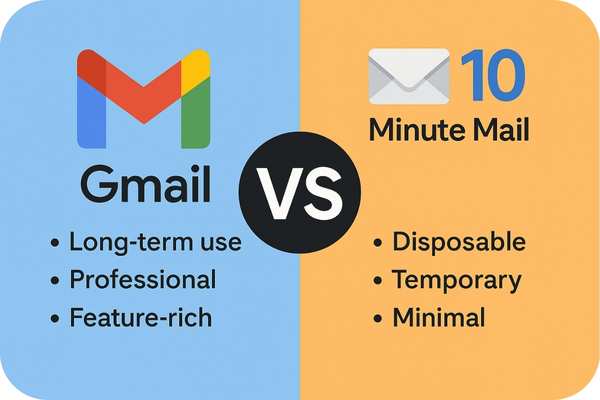You’ll NEVER Believe What This Temp Mail Tool Can Do – Email On Deck Will Blow Your Mind!

In today’s hyper-connected digital world, your email address is basically your online identity. But with every newsletter signup, free trial, or sketchy download site, you’re handing that identity out like flyers at a music festival. That’s where temporary email services—like Temp Mail and Email On Deck—come to the rescue.
These services offer a fast, anonymous way to receive emails without revealing your real address. It’s like having a secret mailbox that self-destructs. Cool, right?
In this guide, we’re diving deep into how these tools work, what makes them different, and when you should (or shouldn’t) use them.
Introduction to Temporary Emails
The Need for Privacy and Anonymity Online
Let’s face it—data is the new currency, and your email address is a golden ticket for marketers, spammers, and sometimes even hackers. Once you sign up for something online, your inbox can become a war zone of promotional blasts and phishing attempts.
Temporary emails solve this by giving you a decoy email that you can use and discard without any commitment. No personal info needed. No strings attached.
How Temp Emails Work
Temporary email services generate a random email address for you instantly. You use that email to receive messages, typically for a short time (10 minutes to a few hours), and then it disappears.
Here’s a quick breakdown:
-
You visit a temp mail website.
-
A unique email is auto-generated.
-
You copy it and use it for whatever you need (like email verification).
-
Any incoming messages show up on the website’s inbox.
-
After a certain time, poof—it’s gone.
No passwords. No signups. No problem.
Understanding Temp Mail
Definition of Temp Mail
Temp Mail is a generic term for disposable email addresses that exist temporarily. You can use them to receive emails anonymously and avoid spam. It’s like having a burner phone for your inbox.
Key Features of Temp Mail Services
Instant Creation
Temp emails are created instantly—just land on the site, and your email is waiting. No forms, no captchas, just an inbox on-demand.
Auto-Expiration
Most services automatically delete the mailbox and its contents after a short time—often between 10 minutes to 24 hours.
No Registration Needed
You don’t need to sign up for anything, which keeps your identity totally under wraps.
Disposable Nature
Once your temporary session ends, there’s no way to recover the inbox or its messages. It’s meant to be used and discarded.
These features make Temp Mail a go-to solution for quick, risk-free interactions online.
What is Email On Deck?
Overview of Email On Deck
Email On Deck is one of the leading temporary email services out there. It’s known for its simplicity, speed, and no-nonsense approach to temp mail.
It lets users generate disposable email addresses in just one click, allowing you to bypass pesky signups and access content without sharing personal information.
Unique Features of Email On Deck
Secure Temporary Emails
Email On Deck takes privacy seriously. It uses encryption and doesn’t track your IP or browsing habits.
User-Friendly Interface
It’s designed for minimalists—one clean page, one button to generate your email, and a live inbox right below. You don’t need a manual to use it.
Spam-Free Experience
Because these emails expire fast, marketers can’t keep bombarding you. Your real inbox stays clean, and your online footprint stays light.
Use Cases for Temporary Emails
Signing Up for Free Trials
Want to check out a new tool or service but don’t want the avalanche of follow-up emails? Temp emails let you bypass the commitment and test things anonymously.
Avoiding Spam
Anytime you suspect a website might sell your data or send endless promos, use a temporary email instead. It acts as a shield for your real inbox.
Protecting Your Identity
When browsing shady sites, entering giveaways, or interacting with online forums, using a disposable email keeps you anonymous and safe.
Testing & Development Purposes
Developers and QA testers often use temp mails to test account creation, email flows, or verification systems without cluttering their real inbox.
Temp Mail vs. Email On Deck
Comparison of Features
While both Temp Mail and Email On Deck serve the same purpose, they have slightly different flavors when it comes to features. Think of it like choosing between Coke and Pepsi—similar idea, different experience.
Temp Mail typically provides a more minimalistic experience. You visit the website, and boom—your temporary inbox is right there, already working. It supports multiple domains and usually doesn’t require any interaction beyond copy-pasting your temporary email.
Email On Deck, on the other hand, offers a slightly more curated experience. It gives you more control over your inbox session and emphasizes better security practices. Some users say it’s faster and more reliable, especially when it comes to email delivery for important verifications.
Here’s a quick comparison:
| Feature | Temp Mail | Email On Deck |
|---|---|---|
| Auto Email Generation | ✅ | ✅ |
| No Registration | ✅ | ✅ |
| Domain Variety | ✅ | ❌ |
| Enhanced Security | ❌ | ✅ |
| Spam Filtering | ❌ | ✅ |
| Interface Simplicity | ✅ | ✅ |
| IP Masking | ❌ | ✅ |
Speed and Ease of Use
Speed-wise, both are excellent. Temp Mail is instant. Email On Deck adds a tiny loading screen but offers more reliability in email delivery, especially for services that filter temp domains.
In terms of ease of use, it’s neck-and-neck. If you like super-simple interfaces, Temp Mail wins. If you prefer a little more control and security, Email On Deck is your guy.
Security and Privacy Measures
This is where Email On Deck edges ahead. It uses HTTPS encryption, avoids storing unnecessary user data, and even changes domains frequently to avoid blacklists.
Temp Mail is secure enough for casual use, but Email On Deck is better suited for users concerned about privacy or who are accessing temp mail from shared or public networks.
Pros and Cons of Using Temporary Emails
Advantages
-
No spam: Temporary emails help you avoid long-term spam or promotional mail.
-
Fast access: No registration means you get an inbox in seconds.
-
Anonymity: These emails don’t require personal information.
-
Testing tools: Developers love them for QA and debugging.
-
Security: Limits exposure to malware or phishing attempts via your real inbox.
Disadvantages and Limitations
-
Temporary lifespan: Emails are auto-deleted, so if you forget to check, you lose access forever.
-
Not accepted everywhere: Some sites recognize and block temp domains.
-
No password recovery: If you use a temp mail for an account and forget the password, recovery is impossible.
-
Inboxes are sometimes shared: Rarely, but in some cases, if two users access the same temp address, there could be overlap.
Basically, they’re great for one-time use but not ideal for anything you want to keep long-term access to.
Is It Legal and Safe to Use Temp Mail?
Legal Perspectives
Using temporary emails is completely legal in most countries. It’s your right to protect your privacy online, and no law says you must use your personal email address for every interaction.
However, misuse—like creating fake accounts for fraud or deception—crosses the line into illegal territory. So as long as you’re not using these tools for shady purposes, you’re on solid legal ground.
Privacy and Ethical Considerations
Ethically speaking, temp emails strike a balance. They protect users from spam and privacy breaches, but they can also be misused for creating fake identities or spamming forums.
It’s about intent. If you’re using temp emails to avoid spam, test websites, or protect yourself, that’s totally valid. If you’re using them to deceive or spam others, not so much.
From a safety perspective, make sure you’re on a secure network when using any email service. Stick to trusted platforms, and avoid entering sensitive personal data using a temp email.
Common Myths About Temp Emails
Misconceptions vs. Reality
-
Myth 1: Temp emails are illegal.
Reality: They’re completely legal. They’re privacy tools, not black market tools. -
Myth 2: You can’t receive real emails with them.
Reality: You absolutely can. They work just like any inbox for the time being. -
Myth 3: They’re only used by hackers.
Reality: Tons of regular users, developers, marketers, and even educators use them responsibly. -
Myth 4: You can’t get verification emails.
Reality: Most temp email services can receive emails from popular sites unless the domain is blacklisted.
Clarifying the Legitimacy
The legitimacy of using a temp email boils down to purpose. If you’re protecting your privacy, you’re totally in the clear. But if you’re trying to manipulate platforms or break rules—well, that’s on you.
Like a Swiss Army knife, temporary email can be incredibly useful or misused—it all depends on the user.
Tips for Using Temporary Email Safely
Choosing the Right Service
Not all temporary email services are created equal. Look for:
-
HTTPS encryption
-
Good uptime
-
Active spam filtering
-
No forced registration
Email On Deck is a solid option for all of these.
Avoiding Phishing and Scams
Even temporary inboxes aren’t immune to scams. Always:
-
Avoid clicking suspicious links.
-
Don’t download unexpected attachments.
-
Double-check sender details before acting.
Just because it’s a throwaway inbox doesn’t mean you should let your guard down.
Also, avoid using temp emails for anything involving sensitive or financial information. That’s a recipe for disaster.
Best Alternatives to Email On Deck
10 Minute Mail
10 Minute Mail is probably one of the most recognized names in the temporary email space. True to its name, it gives you a disposable email that self-destructs after 10 minutes. Simple, fast, and super effective.
Here’s why people love it:
-
You don’t need to do anything—just visit the site and the inbox is ready.
-
The timer resets every time you refresh the page, so you can extend the life a bit if needed.
-
Great for quick sign-ups and avoiding spam.
But it’s not perfect:
-
Limited customization (you can’t choose your email prefix or domain).
-
Some services recognize and block their domains.
Still, if you need a quick and dirty email solution, 10 Minute Mail delivers.
Guerrilla Mail
This one’s a bit more advanced. Guerrilla Mail lets you customize your email username and even choose from several domains. It also offers a handy feature: you can send emails (which most temp services don’t allow).
Why it stands out:
-
Offers both email receiving and sending.
-
You can keep the inbox alive for hours or even longer.
-
No sign-up required, and it supports attachments.
Downsides?
-
The interface is a little outdated.
-
Sometimes slower in email delivery.
But if you’re looking for a powerful, flexible temporary email service, Guerrilla Mail is definitely worth a look.
TempMail.org
TempMail.org is another sleek and user-friendly option. It emphasizes clean design and mobile-friendliness, making it great for users on smartphones or tablets.
Notable features:
-
Quick setup with automatic email generation.
-
Available as a browser extension and mobile app.
-
Frequently refreshed domains to avoid blacklisting.
Its biggest drawback? Limited control over the generated email. But for casual users, that’s rarely an issue.
So, if Email On Deck isn’t your thing, you’ve got plenty of strong alternatives to explore.
When Not to Use Temporary Emails
Online Banking or Personal Services
This one’s a no-brainer. Never use a temp email for anything tied to your personal identity or finances. That includes:
-
Bank accounts
-
Utility portals
-
Tax filings
-
Medical portals
-
Government services
These accounts often require two-factor authentication, recovery options, and long-term access. Using a disposable inbox could lock you out permanently—or worse, leave your data vulnerable.
Long-Term Account Access Needs
Some online services—like social media, subscription tools, or gaming accounts—might seem like a good fit for temp emails. But ask yourself: Will I need to log in again later?
If the answer is yes, skip the temp email. Otherwise, you risk losing:
-
Password recovery options
-
Account verification capabilities
-
Customer service communication
Basically, temp emails are great for temporary use. If you care about keeping an account or staying in touch, use a real email.
How to Spot a Fake Email from Temp Services
Domain Red Flags
If you run a website or manage user data, it’s helpful to spot when someone’s using a temp email. Here’s how:
-
Look for known temp domains (e.g., *@10minutemail.com, *@tempinboxmail.com).
-
Maintain a blacklist of these domains to prevent abuse.
-
Use email validation APIs that detect disposable email addresses.
Users aren’t trying to scam you—many just want to avoid spam. But if your platform requires genuine user accounts, filtering temp emails can help maintain quality.
Headers and Metadata
If you dig deeper into email headers, you’ll often find clues about the service that sent it:
-
Temp emails usually have minimal header info.
-
Look for unusual “Received” paths or missing SPF/DKIM authentication.
-
Sometimes, the mail server will point back to a known temp mail host.
Tools like MailTester, Hunter.io, or ZeroBounce can also detect whether an email is disposable or permanent.
Future of Temporary Email Services
AI and Smart Spam Filters
The rise of AI-driven spam filters means legitimate users often get caught in the crossfire. Temp email services are responding by:
-
Rotating domains frequently
-
Improving delivery reliability
-
Mimicking real email headers to bypass filters
Some even plan to integrate AI to provide smarter inbox control, allowing you to whitelist or blacklist types of messages within temporary email dashboards.
Enhanced Privacy Laws Impact
As data privacy regulations tighten (think GDPR, CCPA), more users are turning to tools like Temp Mail to control their exposure. Ironically, laws meant to protect consumer data are fueling the rise of anonymous browsing and communication tools.
In the future, we might see more “privacy-first” email platforms that blur the line between temporary and permanent email—offering anonymity, encryption, and control without sacrificing usability.
Conclusion
Temporary email services like Temp Mail and Email On Deck are game-changers for anyone who wants to navigate the internet without leaving digital breadcrumbs everywhere. They’re fast, simple, and surprisingly effective at protecting your inbox from spam, scams, and unwanted promotions.
Whether you’re testing a tool, signing up for a freebie, or just don’t trust a site with your personal info, disposable emails are the way to go. But like any tool, they have their place. Use them wisely, avoid applying them where permanence or identity is needed, and you’ll get all the benefits without the drawbacks.
FAQs
Can temp mails be traced?
Not easily. Most temp email services don’t log IPs or retain any data after the inbox expires. But if law enforcement is involved, some minimal logs could potentially be subpoenaed.
How long do emails stay in Email On Deck?
Typically for a few hours or until the session expires. Once your browser is closed or the time runs out, your inbox and messages are gone.
Can you use Temp Mail for social media?
Technically yes, but not recommended. Many platforms block disposable emails or flag them as suspicious. Plus, you won’t be able to recover your account if something goes wrong.
Is Email On Deck better than 10 Minute Mail?
Depends on what you need. Email On Deck offers better security and reliability, while 10 Minute Mail is faster and more straightforward. Choose based on whether you need speed or control.
Do temporary emails work everywhere?
No. Some websites block temp mail domains or require persistent email access. Always test and check if a platform supports temp mail before relying on it.





